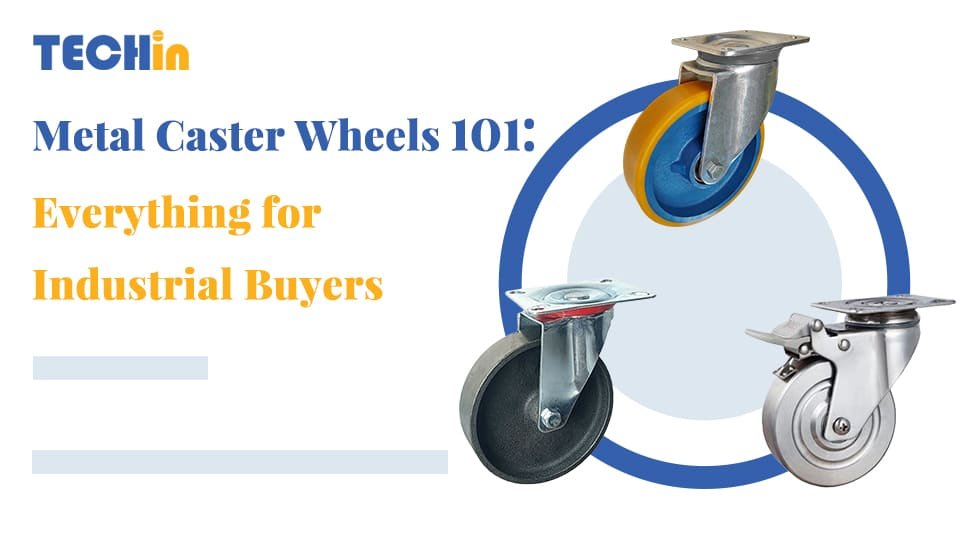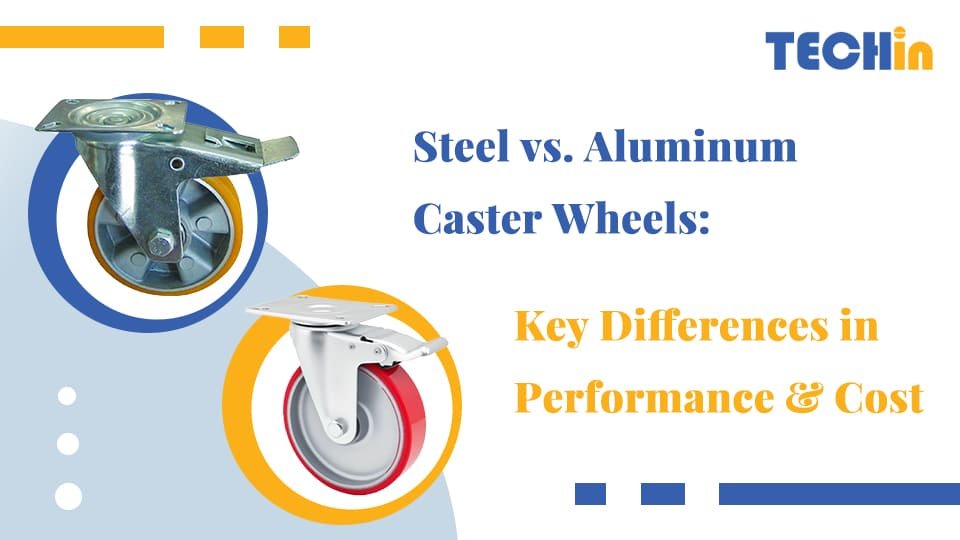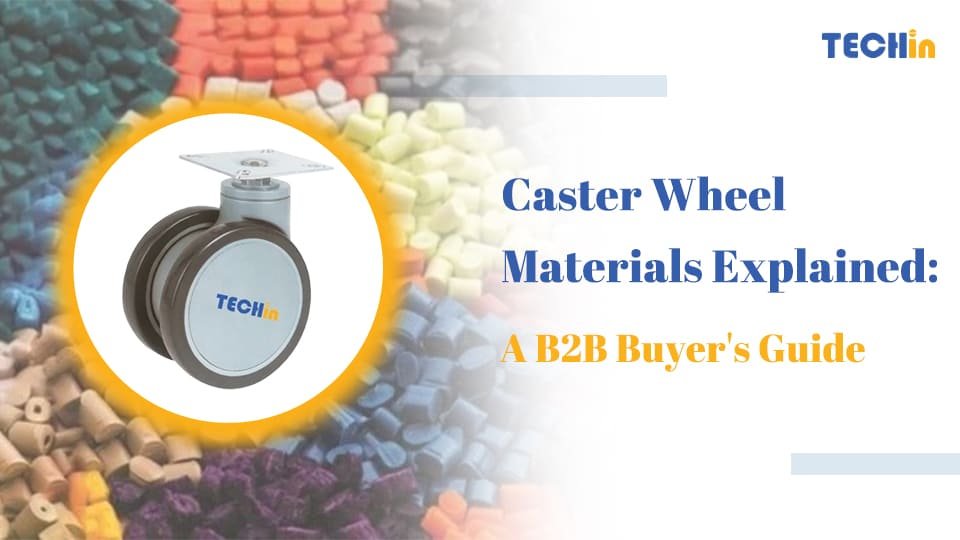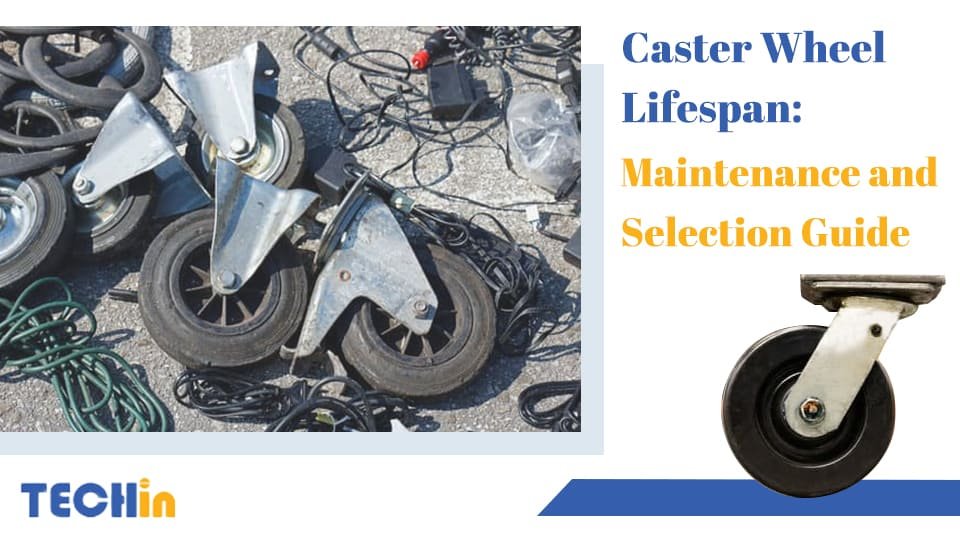1. Introduction
Casters are a big deal in industries like manufacturing, healthcare, logistics, and retail. They’re the things that make equipment mobile, safe, and productive. But, should you buy standard, off-the-shelf casters or have them custom-made for your specific application? That’s the question I’m going to answer for you in this guide. I’m going to give you the pros and cons of each so you can make an informed decision.
2. Understanding Standard Casters
2.1 Characteristics of Standard Casters
Standard casters come in a variety of sizes, materials, and load capacities to serve a wide range of general applications. They are available through most industrial and retail suppliers and can be ordered quickly to meet immediate needs.
2.2 Benefits of Standard Casters
- Cost-Effectiveness: Standard casters are generally less expensive due to mass production. They offer a budget-friendly solution for projects where custom features are not required.
- Quick Availability: Because they are stocked in bulk, standard casters are usually ready for immediate shipping, making them ideal for projects with tight timelines.
- Basic Versatility: With options available in different wheel diameters, materials (e.g., rubber, plastic, steel), and mounting types, standard casters can fulfill basic requirements across various settings.
2.3 Limitations of Standard Casters
- Performance Constraints: Standard casters are often designed for general use, which means they may struggle under heavy loads, rough terrains, or high temperatures.
- Limited Customization: While there is some variety in size and material, standard casters lack the tailored features that specialized applications might require.
- Shorter Lifespan: In high-stress environments, standard casters may wear out faster, leading to more frequent replacements and potential operational interruptions.
2.4 Common Applications for Standard Casters
- Office Furniture: Chairs, desks, and mobile storage units that require light to moderate weight capacity.
- Retail Displays: Movable shelves and garment racks for easy repositioning.
- Light-Duty Carts: Utility carts in restaurants or for light warehouse work.
3. Exploring Custom-Made Casters
3.1 What Makes Custom-Made Casters Unique?
Custom-made casters are built to meet specific performance criteria tailored to unique applications. This includes customizing materials, wheel size, load capacity, and integrating special features like heat-resistant coatings or locking mechanisms.
3.2 Advantages of Custom-Made Casters
- Precision Engineering: Each aspect of a custom-made caster can be tailored, ensuring it fits the exact specifications needed for optimal operation in specific environments.
- Enhanced Durability: Custom casters are often made with high-grade materials designed to last in harsh conditions, reducing wear and extending the lifespan.
- Special Features and Customization:
- Noise Reduction: Specialized wheels and bearings can reduce operational noise, which is ideal for hospitals and other noise-sensitive environments.
- Heat and Chemical Resistance: Custom coatings and materials ensure that the casters can operate in high-temperature or chemically active environments without degrading.
- Load-Specific Engineering: Wheels designed for heavy loads use reinforced structures and durable materials to prevent deformation or failure.
3.3 Potential Downsides of Custom-Made Casters
- Higher Initial Costs: Customization requires design, specialized materials, and unique manufacturing processes, which can make these casters more expensive than standard options.
- Longer Lead Times: The production of custom-made casters can take weeks or even months, depending on the level of customization and the supplier’s production schedule.
- Complexity in Design and Procurement: Developing custom casters often requires in-depth consultations with engineers or suppliers to specify all desired features accurately.
3.4 Common Applications for Custom-Made Casters
- Medical Equipment: Hospital beds, surgical tables, and patient transport carts that require smooth, silent movement and durability.
- Industrial Machinery: Heavy-duty equipment in manufacturing plants that needs casters capable of supporting significant loads without compromising mobility.
- Food Processing: Carts and machinery that need casters made from materials that withstand moisture and meet hygiene standards.
4. Custom-Made vs. Standard Casters: Key Comparisons
4.1 Performance and Durability
Standard Casters: While standard casters are reliable for general-purpose use, they may fail under continuous heavy loads or harsh conditions. For instance, a standard caster used in a busy warehouse may need replacement multiple times a year.
Custom-Made Casters: Built from high-grade components, custom casters can withstand continuous use, heavy loads, and tough environmental conditions. For example, a custom caster with reinforced polyurethane wheels and sealed precision bearings might last several years in a factory that runs 24/7.
4.2 Cost Analysis
Standard Casters: These are economical initially, making them a practical choice for projects with tight budgets or minimal load and durability needs.
Custom-Made Casters: Although more expensive up front, their durability and reduced maintenance needs can lead to lower overall costs. A custom caster might last five times longer than a standard caster, effectively lowering the cost per year of use.
4.3 Lead Time and Availability
Standard Casters: Ideal for projects with immediate needs due to their ready availability from suppliers.
Custom-Made Casters: Require additional lead time for design, testing, and production. For highly customized projects, it may take several months before the casters are ready for use.
4.4 Customization and Flexibility
Standard Casters: Offer limited flexibility and are best for straightforward applications. The features are restricted to what is available in pre-existing models.
Custom-Made Casters: Provide unparalleled flexibility in features such as:
- Custom Tread Patterns: Designed for specific traction needs or surface types.
- Locking Mechanisms: Enhanced locking capabilities for added stability.
- Adjustable Heights: For applications requiring variable clearance.
4.5 Maintenance and Longevity
Standard Casters: May need frequent lubrication and part replacements in high-use environments. For example, a standard caster on an industrial cart may require replacement every six months.
Custom-Made Casters: Typically designed with advanced seals and high quality bearings, reducing maintenance frequency. In a hospital setting, custom casters designed with silent, sealed ball bearings could last years with minimal service.
4.6 Compatibility and Retrofitting
Standard Casters: Easier to replace and interchange as they follow common industry sizes and fittings.
Custom-Made Casters: May require adjustments or specific fittings for retrofitting, which could complicate replacement or repair processes.
5. Customization Services for Casters
When opting for custom-made casters, understanding the available customization services can help you tailor the perfect solution for your specific application. Here’s what to look for in a comprehensive customization service:
5.1 Material Selection
Customization services go beyond common materials and offer specialized options to meet unique application needs. Examples include:
- High-Temperature Alloys: For operations involving exposure to extreme heat, such as in industrial ovens or metalworking facilities. Casters made with heat-resistant alloys maintain structural integrity at high temperatures.
- Anti-Corrosive Coatings: Ideal for environments exposed to moisture, chemicals, or saltwater. Casters with stainless steel or zinc-plated coatings are excellent for food processing plants and marine applications.
- Elastomer Blends: Tailored rubber or polyurethane blends that provide enhanced durability and specific resistance to chemicals or oils. This customization is valuable in automotive or chemical processing plants.
- Conductive Materials: Casters made with conductive components prevent the buildup of static electricity, essential for environments handling sensitive electronics, such as data centers or semiconductor manufacturing.
- Shock-Absorbing Composites: Casters constructed with specialized composites that reduce vibrations and impacts, useful for delicate medical or lab equipment.
5.2 Wheel and Tread Design
Custom wheel and tread designs can be developed to address specialized movement requirements:
- Grooved or Ribbed Treads: Enhance traction on surfaces prone to wetness or oil, suitable for industrial kitchens or factory floors.
- Non-Marking Treads: Prevent floor damage and streaks, making them perfect for hospitals, retail spaces, and high-traffic public areas.
- Dual-Density Wheels: Combine a hard inner core for strength with a softer outer layer for smooth, quiet operation. These are beneficial in noise-sensitive environments such as libraries or office spaces.
5.3 Custom Mounting and Fittings
Mounting options can be adjusted to fit specific equipment setups:
- Custom Plate Sizes: Designed to match non-standard mounting requirements on unique machinery or carts.
- Precision-Machined Stems: Custom-sized stems and thread types ensure secure fitting for specialized equipment.
5.4 Specialty Features
- Swivel and Directional Locks: Custom casters can be fitted with advanced locking mechanisms that allow for precise control in narrow spaces or when transporting heavy loads.
- Enhanced Braking Systems: Specialized brakes, such as foot-operated or automatic locking systems, provide safety and stability in high-load or high-movement applications.
- Shock Absorption Technology: Integrated suspension features that cushion the load, minimizing vibrations and protecting sensitive items.
5.5 Aesthetic Customization
Custom casters can be tailored for branding and visual integration:
- Color-Matched Coatings: Select custom colors to match company branding or facility aesthetics.
- Logo Embossing or Printing: Casters can be personalized with company logos, providing a professional and cohesive look for customer-facing equipment.
5.6 Consulting Services
A comprehensive customization service should include consultation with engineering experts to guide you through selecting the right features and materials for your specific needs. This ensures your custom casters meet performance expectations, comply with safety regulations, and integrate seamlessly into your operation.
6. Factors to Consider When Choosing Between Custom and Standard Casters
6.1 Application Requirements
- Load Capacity: For equipment with significant weight, custom casters with reinforced components are recommended.
- Surface Type: Uneven or rough surfaces may require specialized tread designs that only custom casters can provide.
6.2 Budget Constraints
- Initial Investment: Standard casters are a go-to option when cost is a significant concern, as they are cheaper upfront.
- Long-Term Savings: Custom casters, although pricier initially, could offer cost savings over time by reducing downtime and the need for replacements.
6.3 Environmental Conditions
- Extreme Temperatures: Custom casters can be designed with heat-resistant materials, while standard casters may degrade or deform under high temperatures.
- Moisture and Chemical Resistance: For use in environments where exposure to moisture or chemicals is frequent, custom casters made from corrosion-resistant materials are the better choice.
6.4 Frequency of Use
- Intermittent Use: Standard casters are suitable for equipment that is moved occasionally.
- Continuous Use: For non-stop operations, custom casters offer the resilience and reliability needed to minimize wear and tear.
7. Choosing the Right Supplier for Your Caster Needs
7.1 Key Qualities of a Reliable Supplier
- Industry Expertise: Suppliers with experience in your specific industry are better equipped to provide solutions tailored to your needs.
- Certifications: Ensure that the supplier meets industry standards like ISO certifications.
- Customer Support and Consultation: Look for suppliers who offer expert advice, from the design stage to post-installation support.
7.2 Customization Capabilities
Suppliers should have the capacity to offer a wide range of customization options. This includes materials, wheel types, mounting styles, and special features like shock absorption or self-locking mechanisms.
7.3 Case Studies and Testimonials
Reviewing a supplier’s case studies and testimonials provides insight into their ability to deliver quality, customized solutions. For instance, a supplier who successfully provided casters for a cleanroom environment can demonstrate their capability to meet stringent requirements.
8. When to Opt for Standard Casters
Standard casters are best for:
- Projects with budget constraints.
- Applications involving light to moderate use.
- Situations requiring fast, easy replacement.
9. When Custom-Made Casters Are Worth the Investment
Custom casters are ideal for:
- Heavy-duty or continuous-use applications where durability is crucial.
- Specialized environments involving heat, chemicals, or rough terrain.
- Applications where enhanced performance features like noise reduction or shock absorption are necessary.
10. Cost and Return on Investment (ROI) Analysis
10.1 Standard Casters
- Lower Initial Cost: Attractive for projects with limited budgets.
- Higher Replacement Frequency: Leads to higher cumulative costs over time in high-demand applications.
10.2 Custom-Made Casters
- Higher Upfront Investment: Justified by their durability, reduced maintenance needs, and ability to enhance equipment performance.
- Better Long-Term ROI: Improved productivity and fewer replacements contribute to cost-effectiveness over the lifespan of the product.
Example ROI Scenario
A factory using standard casters on assembly line carts may spend $50 per caster and replace them twice a year. Switching to custom casters that cost $150 each but last three years could cut down replacement costs, save labor, and reduce downtime, leading to significant savings over time.
11. FAQs on Choosing the Right Casters
- What factors should I consider when choosing between standard and custom-made casters?
- Evaluate your application needs, budget, and environmental conditions.
- Can custom-made casters be modified post-installation?
- While some adjustments can be made, significant changes may require a new custom order.
- Are custom casters cost-effective for small businesses.
- Yes, especially if the business relies on equipment that operates in demanding conditions.
- What are the durability differences between standard and custom-made casters?
- Custom-made casters use higher-quality materials and precision engineering, making them more durable.
- How long does it take to manufacture custom casters?
- Production times vary but typically range from several weeks to a few months, depending on complexity.
12. Conclusion
Deciding between standard and custom-made casters comes down to knowing what your equipment needs, your budget, and how you’re going to use them. Standard casters are cost-effective and work well for general use. Custom-made casters give you a lot of advantages when you’re doing something specialized or when you have a high demand application. Working with a good supplier will help you make the right choice for your needs and your budget, which will help you be more efficient and make your equipment last longer.










